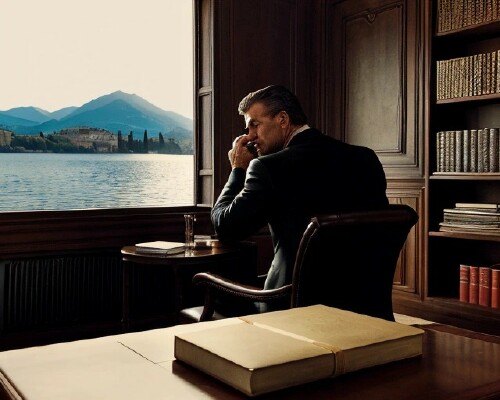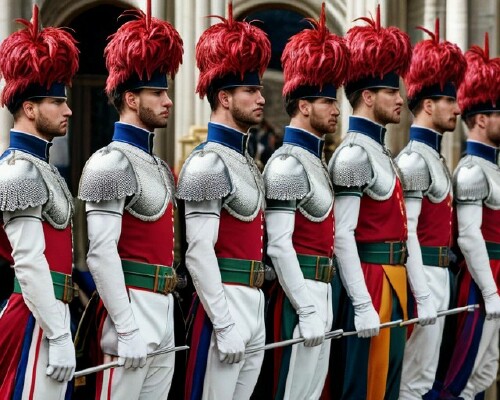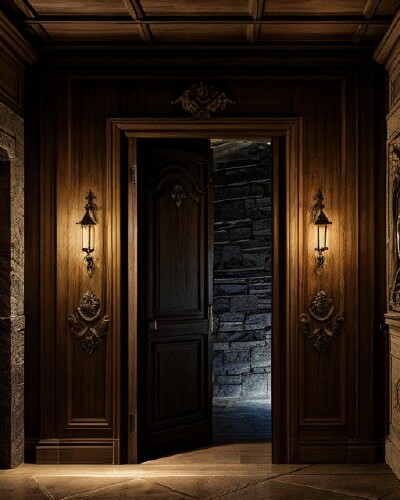A group of Swiss Guards assigned to the Vatican endure a humiliating ritual to atone for a major sin in this sexy new story from Luther5 with a bunch of art pieces by Alpharithm9.
Swiss Guards: Journey to Redemption - Page 1
by Luther5
 1. The Letter
1. The Letter
It looked official, an elegant cream-colored envelope, postmarked with a return address which caught my eye: O. Bieri, Guardia Swizzera Pontificia, 1-00120 Citia del Vaticano. The bottom left-hand corner read Personal & Confidential. It was my custom to slit open any and all commercial mail--bills, notices, subscription renewals--as a courtesy to Mr. Stoddard. But this particular item from O. Bieri would remain sealed. I deposited all the day's mail on his desk in the library, placing the cream-colored envelope, however, on the very top. I was curious as to its contents. My curiosity would soon be satisfied.
2. First Instructions
I was hired initially to work for Paul Stoddard on a temporary basis. Fresh out of the SDA Bocconi School of Management in Milan, I needed work for the summer to help finance my return trip to the USA, good old Chicago, IL. As luck would have it, I received a note from my Aunt Marguerite, a stenographer for the Palmer House in Chicago, that Paul Stoddard, a friend of hers from the University of Chicago, was looking for clerical help and various other related tasks. Transplanted from Illinois to Italy during the mid 1990s, Paul had made his fortune in international investments and banking. Never married, he was now living comfortably in his secluded private home, Villa Chiostro. Located in the Lazio region of Italy, about 45 miles southeast of Rome, it nestled comfortably in the hill country city of Rieti. The villa itself, built in the late 1940s, seemed to be, in my view, everything that a villa should be: sedate, regal, hidden, luxurious, and, with its iron gates and lush gardens, more than a bit mysterious.
During my job interview with Mr. Stoddard, I had asked about the name of his home, Villa Chiostro. He explained that "chiostro" was the Italian name for "cloister."
"You mean, cloister as in a monastic enclosure for monks or nuns, a religious cloister?"
"Yes, in a sense," he answered. "The extensive grounds, combined with the actual architecture of the building, with its peaks and high windows and passageways, reminded me of the many religious convents and monasteries common throughout Italy. All that's missing is the Gregorian chant," he smiled. "Hence the name 'chiostro.' Do you like it?"
"Yes. Very much. It is a beautiful place with a beautiful name. And very quiet, I imagine. The kind of villa one might see in a movie."
He responded with a smile at my naive remark, not in a condescending way, but rather completely understanding that, to an American, not familiar with villas, I was stating something completely obvious and honest. Mr. Stoddard was easy to talk to. I felt completely at ease in his presence. He was impressed with my CV and my transcripts from the university, and, the very next week, offered me the job as his assistant. And his knowing Aunt Marguerite hadn't hurt, either. The temporary summer job, originally designed as a three-month gig, gradually morphed into a permanent position. I was currently now in year six at the villa, living comfortably in the carriage house over the three-car garage. I thanked my Aunt Marguerite nightly in my evening prayers before retiring for bed. Since starting at the villa, I had been back to Chicao only a handful of times for brief family visits. Italy had become my home.
Month by month, year by year, Mr. Stoddard had entrusted more and more responsibilities to my areas of expertise. Overseeing the smooth running of the household, everything from hiring workers for repairs or monitoring the lawn and garden crews, all fell under my jurisdiction. My command of Italian was not exemplary but acceptable, enough for me to communicate clearly with the staff. And, as time went by, my employer was happy to learn that I could perform other useful services as well, such as preparing meals on weekends or holidays when the regular cook was absent. I was also good at technology, especially computers. Mr. Stoddard was not. He appreciated again and again my knowledge of laptops, tablets, databases, printers, passwords, spreadsheets, all the things that made 21st century existence possible. Combined with my knowledge of finance and investment, he considered my presence at the villa important. I was, indeed, an essential worker.
My days at the villa were fulfilling and busy. It was just after breakfast, a day after the cream-colored envelope had arrived from the mysterious O. Bieri, that Stoddard asked to see me in the library.
He was seated at his desk by the large leaded-glass windows, sipping casually on the remnants of his morning coffee as I entered
the room. The cream-colored envelope lay open on the desk, the enclosed letter held in his right hand.
"Please take a seat," he said to me. "This might take awhile," his voice now containing a note of concern.
 He explained that Oskar Bieri, a former business associate from years ago, had sent him a rather strange request. Oskar had been a young intern in Rome at the bank where Paul Stoddard had been assistant VP. Paul and Oskar had become good friends, Paul being disappointed when he learned Oskar had decided to leave the bank for entrance, of all things, into the papal Swiss Guards. Originally from Switzerland, Oskar had served two years in the Swiss Army before starting his career in finance and business administration. Now in his mid thirties, Oskar had a successful career with the guards. He currently was in charge of overseeing the construction of new barracks for the guards, expanding the living space of the previous structure into 135 private rooms, ending the dormitory-style living which had served the guards for five centuries. In the letter, Oskar explained, in rather broad terms, that in addition to overseeing the construction of the new barracks, he had been asked to assist with a certain matter of great delicacy.
He explained that Oskar Bieri, a former business associate from years ago, had sent him a rather strange request. Oskar had been a young intern in Rome at the bank where Paul Stoddard had been assistant VP. Paul and Oskar had become good friends, Paul being disappointed when he learned Oskar had decided to leave the bank for entrance, of all things, into the papal Swiss Guards. Originally from Switzerland, Oskar had served two years in the Swiss Army before starting his career in finance and business administration. Now in his mid thirties, Oskar had a successful career with the guards. He currently was in charge of overseeing the construction of new barracks for the guards, expanding the living space of the previous structure into 135 private rooms, ending the dormitory-style living which had served the guards for five centuries. In the letter, Oskar explained, in rather broad terms, that in addition to overseeing the construction of the new barracks, he had been asked to assist with a certain matter of great delicacy.
Without giving too many specifics, he explained he had been requested--strongly requested--to oversee a matter involving twelve of the guards.
"They are all in the younger range as guards go," he said. "All in their early 20s. All fit former members of the Swiss Army, as all papal guards are required to be. But they are also twelve young men in trouble. All in need of receiving disciplinary action. I've received strict instructions not to divulge the specifics of their infractions, only that I need the assistance of someone outside the guards themselves, someone like you, to dispense of the discipline in a way and manner that is entirely discreet. I need the help of someone I can trust, and that someone is you, Paul."
I tried to absorb all that I was being told as the minutes ticked away on the fireplace mantel clock. Swiss Guards. Discipline. Secrecy. Discretion. Infractions. What am I getting into here, I thought. I felt much more comfortable dealing with cooks and lawn crews rather than with twelve Swiss guards.
After revealing a few more details, Paul folded the letter and placed it back into its envelope. Then, taking a blank sheet of paper, he wrote the names of five Italian businessmen, asking me to set up a Zoom conference session with them in five days.
"I need to speak with them ASAP," Paul explained. "Will five days be long enough for you to set things up, send them the links, passwords, and so forth?"
"Yes, Sir," I responded. "Do I need to provide any additional information when contacting them?"
"No, just say Paul will explain everything they need to know during the meeting."
And with that, he took another sip of his cooling coffee, indicating that our meeting in the library was over. I got to work immediately in setting up the conference call, sensing the urgency in his voice. Within the next two hours or so, all five of the participants had been contacted. All five had responded "Yes" to the online invitation. I waited for further instructions.
 3. Second Instructions
3. Second Instructions
I had another meeting with Paul in the library five days later. The Zoom conference had ended only minutes ago. Paul handed me a list of instructions. Among them was the startling announcement that a special bus transporting Oskar Bieri and twelve Swiss Guards would be arriving in two weeks. I was to meet them personally at the front gate at precisely 12 midnight. The guards and Bieri would be here at the villa for approximately five hours. They would depart shortly before sunset as mysteriously as they had arrived, in a small chartered bus, a bus directly from the Vatican. No one at Villa Chiostro except myself was to know of the upcoming visit of the twelve young papal Swiss Guards.
4. The Visit: Part I
The night was balmy and eerily windy. I waited at the gates with feelings of expectation, not sure exactly what those expectations were. The winds rose and fell, the trees casting shadows as their branches swayed in the night breeze. I was prepared as far as I had been instructed. The computer cameras had been set up in the cavernous space of the underground wine cellar beneath the main floor of the villa. Why they were needed had remained a mystery.
My thoughts were suddenly interrupted by the glare of headlights at the front gates. My cell phone immediately rang.
"Bieri here. We have arrived."
"I will unlock the gates," I replied. "Welcome to Villa Chiostro."
And with that, the dark-tinted windowed bus proceeded onto the property. I quickly followed on foot, arriving at the front door to the villa just as the bus came to a complete stop I produced my keys and opened the large double doors to the front entrance hall. I turned from the entrance doors and faced the parked bus. The doors slowly opened. Within seconds, twelve exquisitely dressed Swiss guards exited the bus in single file. They remained standing on the brick walkway until Oskar Bieri exited. He then asked me to lead the way. I nodded, motioning for him and the guards to enter. Silently, I led them to the wine cellar.
PREVIOUS CHAPTER | NEXT CHAPTER
